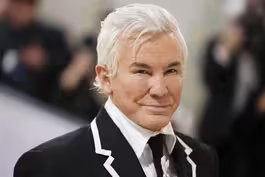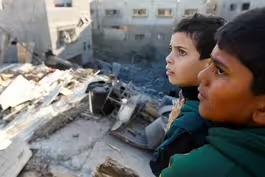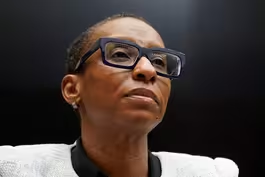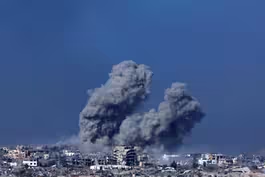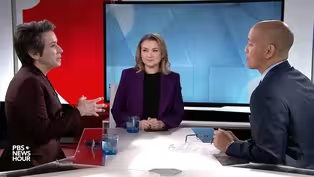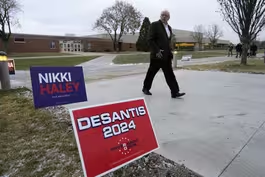
Research shows climate change putting human health at risk
Clip: 12/11/2023 | 8m 14sVideo has Closed Captions
How physicians are preparing for climate change and extreme heat's impact on human health
As the U.N. climate conference nears its end, there's concern over whether countries can or will meet prior pledges to hold down global temperatures. If temperatures continue to climb, the impact on health could be profound and some doctors say their profession is not prepared. William Brangham reports in collaboration with the Global Health Reporting Center with support from the Pulitzer Center.
Problems playing video? | Closed Captioning Feedback
Problems playing video? | Closed Captioning Feedback
Major corporate funding for the PBS News Hour is provided by BDO, BNSF, Consumer Cellular, American Cruise Lines, and Raymond James. Funding for the PBS NewsHour Weekend is provided by...

Research shows climate change putting human health at risk
Clip: 12/11/2023 | 8m 14sVideo has Closed Captions
As the U.N. climate conference nears its end, there's concern over whether countries can or will meet prior pledges to hold down global temperatures. If temperatures continue to climb, the impact on health could be profound and some doctors say their profession is not prepared. William Brangham reports in collaboration with the Global Health Reporting Center with support from the Pulitzer Center.
Problems playing video? | Closed Captioning Feedback
How to Watch PBS News Hour
PBS News Hour is available to stream on pbs.org and the free PBS App, available on iPhone, Apple TV, Android TV, Android smartphones, Amazon Fire TV, Amazon Fire Tablet, Roku, Samsung Smart TV, and Vizio.
Providing Support for PBS.org
Learn Moreabout PBS online sponsorshipwhether countries can or will meet their prior# pledges to hold down global temperatures.
If temperatures continue to climb, the# impact on human health could be profound,## and some doctors say their# profession is not prepared.
William Brangham has the story, in collaboration## with the Global Health Reporting Center,# WI LLIAM BRANGHAM: On a chilly fall# day in Cambridge, Massachusetts,## the conversation here at Harvard is about# extreme heat and how in South it kills tens of thousands of people every year.
DR. SATCHIT BALSARI, Harvard University: The# water, the portable water be that they can't drink it.
WILLIAM the CrisisReady initiative at Harvard.# He's part of a movement to get doctors## focused on how climate change impacts# human health And how to respond.
You're an emergency room physician.
How is it# that you are talking so much about climate change?
DR. SATCHIT BALSARI: I mean, there is a# direct impact on health.
Heat waves will## lead to heat illness and heat exhaustion and# heat stroke.
People present to the emergency## room when there are wildfires and there is smoke# and there's more particulate matter in the ai And -- but there is also a persistent tale# of morbidity and mortality that these extreme## weather events are resulting in, in this# day and age, even in the developed world.
MAN: The rickshaw pullers are the# first victims of temperature increase.
WILLIAM BRANGHAM: Today, he and his# colleagues are working on a project## to try and understand and hopefully# mitigate some of the heat in places where millions of the# world's poorest people live and work.
In India, Balsari's team partnered with# the Self-Employed Women's Association,## a union that represents small-scale# independent workers, who make up the## vast bulk of India's population.
By giving# them tiny, wearable temperature sensors,## they found the women were often experiencing heat# extremes well beyond what was officially recorded.
DR. SATCHIT BALSARI: So this is# Madhuben's house.
Madhuben works## from home.
She's a weaver.
I'll just# sh for example, the green dots are the satellite# observations.
So that's NASA powe WILLIAM BRANGHAM: But the gold shows the# readings from the sensors in the women's homes.
DR. SATCHIT BALSARI: So there is# a 10 degree difference between the## temperature outside and the temperature at home.
WILLIAM BRANGHAM: So the cruder# temperatur oh, it's actually not so bad# because its cooling at night DR. SATCHIT BALSARI: Yes.
it's much more unpleasant.
DR. SATCHIT BA WILLIAM BRANGHAM: Living and working# in 45 degrees 113 degrees Fahrenheit -- is more# than unpleasant.
It's dangerous.
DR. SATCHIT BALSARI: This has massive# ramifications for workplace safety as## well.
To be able to say that when# it is only 40 degrees outside,## we know that these kinds of workshops# actually are at 45 or 48 degrees.
WILLIAM BRANGHAM: This kind# of fine-grained data points## to problems and solutions which# are barely DR. SATCHIT BALSARI: If we had better# information about local climates,## you could change school timings, for example.# There were a bunch of children of workers that## we were working with who stopped going to# school because it would get so hot in the## afternoon that their feet would burn# when they would step on the asphalt.
And so they just stopped going to school.# And unless you're on the field studying this,## it wouldn't really occur to any of us that school## dropouts is because its too# hot to walk back from school.
DR. CAROLINE BUCKEE, Harvard University: Trying# to do better models, using microclimate v WILLIAM BRANGHAM: Balsari's partner# in this work is Dr. Caroline Buckee,## a Harvard professor of epidemiology.
DR. CAROLINE BUCKEE: A lot of the ways that we# are from large global models, remote sensing# data from satellites and things like And the scale in which we're talking about# the problem is often too large.
So we don't## have that granular, human scale data to# understand the impacts of climate change.
WILLIAM BRANGHAM: Getting better data is# critical.
Knowing who is most affected## could trigger insurance payments,# disaster declarations, and more.
For Balsari, Hurricane Maria, the storm which# devastated Puerto Rico in 2017, was a crystal## clear example of a climate-driven# disaster impacting human health.
DR. SATCHIT BALSARI: Caroline Buckee# and I were involved in a study.
While## the initial government estimates# were that about 64 people the study suggested that the true# mortality was closer to about 4,000.
They didn't die on the day of the# landfall.
They died for months of## disruption to other aspects of their lives.
WILLIAM BRANGHAM: Disruptions like power outages,# shortages of medicine, and a loss# of MAN: So I can talk pretty loud, but# I can't probably talk that loud.
WILLIAM BRANGHAM: And so how can the medical## community help preve In a first-of-its-kind program run by the# University of Colorado School of Medicine, that' a main focus.
These doctors and nurses are working# towards a diploma in climate medicine.
It involves## five separate courses, from making hospitals# more environmentally friendly, to this training## session at the aptly named Disaster City at the# Texas A&M Engineering and Extension Service.
DR. TERRY O'CONNOR, University of Colorado:# The 911 center will send a liaison.
WILLIAM BRANGHAM: Dr. Terry O'Connor from## the University of Colora DR. TERRY O'CONNOR: Some of these# events are coming more and more## with less pre-notification.
They a WILLIAM BRANGHAM: The damage caused by weather# disasters is on the rise, not just because of## a warming world, but also because more# people are moving into vulnerable areas.
DR. TERRY O'CONNOR: When we inquire within our# own hospital systems or within our medical staff,## we find ourselves still pretty unprepared# for the scope and scale of these even WILLIAM BRANGHAM: Jason Moats, who is# helping to teach the disaster prep course,## says America's medical infrastructure# is woefully unprepared.
Take what## happened to a major Houston hospital# during Hurricane Harvey in 2017.
JASON MOATS, Texas A&M University:# They had put their generator in the## basement of the parking garage.
And,# OK, there.
People won't mess with it.
It's# secure.
But it's also very vulnerable## to the floodwater seeping in.
Yes, well, it# knocked the generator out.
They lost power.
WILLIAM BRANGHAM: They run# through tabletop simulations,## how to respond to floods or fires, how to# deal with extreme cold or extreme heat.
WOMAN: When you lose power, do# not automatically -- does not## every hospital automatically decide to evacuate?
WOMAN: No, because you may not have a place# to evacuate to.
You ma if there's flooding, how are you going to move# your patients if you can't move the vehicles?
WILLIAM BRANGHAM: The students come from all# over the country, wilderness medicine experts,## oncologists, and everything in between.
DR. ELIZABETH CERCEO, Cooper University# Health the emergency room more fun to have different perspectives.
It# really does broaden the experience for us.
DR. TARA BENESCH, University of Colorado# School of Medicine: An experience like,## this course, w WILLIAM BRANGHAM: And this program is part of# a bigger movement.
Since 2019, the number of## U.S. medical schools requiring coursework on the# effects of climate change has more than doubled.
DR. TERRY O'CONNOR: We have a storm on the# horizon that's coming in, and if we don't## do what we can to avoid that problem, we're# in for a world of hurt.
To put it bluntly,## it's giving these providers hope.
That's# probably the most important thing.
WILLIAM BRANGHAM: O'Connor says doctors have to## take up the burden together to forge# For the "PBS NewsHour," I'm William Brangham.
Baz Luhrmann on adapting 'Australia' into a TV miniseries
Video has Closed Captions
Clip: 12/11/2023 | 6m 33s | Baz Luhrmann discusses adapting his film 'Australia' into a TV miniseries (6m 33s)
Global criticism grows as Israel prepares for long fight
Video has Closed Captions
Clip: 12/11/2023 | 3m 39s | International criticism grows as Israel says it's prepared for long fight in Gaza (3m 39s)
Harvard president under pressure after antisemitism hearing
Video has Closed Captions
Clip: 12/11/2023 | 6m 24s | Harvard president under pressure to resign after testimony about antisemitism on campus (6m 24s)
Report: Israel targets infrastructure grow pressure on Hamas
Video has Closed Captions
Clip: 12/11/2023 | 5m 48s | Israel targets infrastructure in Gaza to ramp up civilian pressure on Hamas, report claims (5m 48s)
Russian minorities disproportionately die in Ukraine
Video has Closed Captions
Clip: 12/11/2023 | 6m 10s | Russia’s ethnic minorities disproportionately die in the war in Ukraine (6m 10s)
Tamara Keith and Amy Walter on 2024 Democratic concerns
Video has Closed Captions
Clip: 12/11/2023 | 8m 13s | Tamara Keith and Amy Walter on Democratic concerns about Biden's poll numbers (8m 13s)
Time running out for GOP candidates as Trump grows Iowa lead
Video has Closed Captions
Clip: 12/11/2023 | 2m 59s | Time running out for GOP candidates to make race competitive as Trump grows Iowa lead (2m 59s)
Providing Support for PBS.org
Learn Moreabout PBS online sponsorship
- News and Public Affairs

FRONTLINE is investigative journalism that questions, explains and changes our world.

- News and Public Affairs

Amanpour and Company features conversations with leaders and decision makers.












Support for PBS provided by:
Major corporate funding for the PBS News Hour is provided by BDO, BNSF, Consumer Cellular, American Cruise Lines, and Raymond James. Funding for the PBS NewsHour Weekend is provided by...
